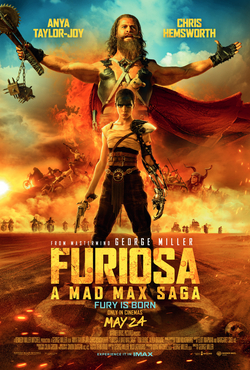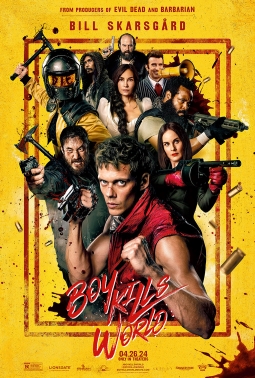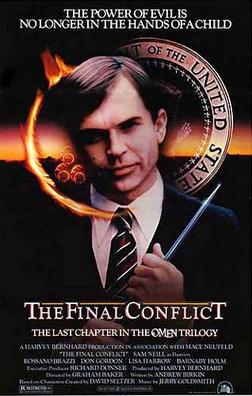It is a bit hard to judge whether Omen IV: The Awakening counts as a feature film or not. While released theatrically in some countries, it was a television film in the United States. Hilariously bad, poorly acted, with a simply dreadful story, Omen IV: The Awakening mercifully was the end of this forced franchise that started well and collapsed under its own convoluted weight.
The York family is about to receive their new adopted daughter from a Catholic orphanage. Sister Yvonne (Megan Leitch) appears happy for them, yet she also appears distraught. Karen York (Faye Grant) soon finds that little Delia is not what she appears to be. Delia manages to scratch her as a newborn! Her husband, Congressman Gene York (Michael Woods) is not too bothered by that bizarre attack. As Delia grows older, he does not appear too bothered that despite being only eight years old, Delia has started menstruating.
He even isn't bothered by how one of Delia's schoolmates is essentially terrorized by her, or that said student's father met a grisly end after berating her and the Yorks. Into this comes a new nanny, Jo Thueson (Ann Hearn), who is deep into New Age mysticism with crystals and auras. She sees that Delia has evil all around her. Fortunately, anyone who gets in Delia's way meets a gruesome end.
That eventually happens to private investigator Earl Knight (Michael Lerner). Karen hired him to find both Delia's birth parents and the now-former Sister Yvonne. She has gone from nun to hooker to Pentecostal snake handler to snake-bit and dead. Karen fears for herself and for the world. What exactly is Delia? She is the long-lost daughter of Damien Thorn, the Antichrist, who is being groomed to take her place. Will the Devil's granddaughter rise to power?
Omen IV: The Awakening could be considered a pioneering film when it comes to representation. Long before the current craze to gender/race-swap leads in franchises so that minority viewers could have someone that looks like them, Omen IV opted to switch out a male Antichrist with a female Antichrist. Granted, The Final Conflict: Omen III had killed off Damien, so it isn't like they could use him. However, how and when Damien knocked up some broad Omen IV is not about to answer. I do not think it even bothered to ask; we're just supposed to roll with it. While Damien did have sex with a woman in The Final Conflict who could have become pregnant with the Antichrist's child, how a British woman ended up giving birth in Pennsylvania's 14th Congressional District and get nuns to help her we know not.
I do not think continuity in the overall Omen series was of concern or even interest to screenwriter Brian Taggert (with story by Taggert and Harvey Bernhard). I do not think even logic was of concern or interest either, for Omen IV never made clear what exactly was Yvonne's problem. Why would she be so upset and concerned over Delia? She was not her biological mother, and there is no proof that she initially knew of Delia's dark origins. It just happens. How she went from nun to hooker to snake handler again just happens.
Taggert's screenplay was so bad that what was meant to be a shocking twist with family friend and doctor Louis Hastings (Madison Mason) was painfully obvious. I wrote early on in my notes, "Bet Doctor is in on it". When Karen confronts Hastings and learns the truth, it is hilariously awful and shockingly quick. There is a running motif of showing us inverted crosses that, again, I think is meant to be shocking. It soon becomes a running gag and a guessing game to see when and how yet another inverted cross will pop up.
Omen IV is not a horror film. It is a comedy veering on spoof. Late in the film, Earl is confronted by a demonic choir singing, if memory serves correct, the Ave Satani from The Omen. With the singing, the make-up work and the overall cheap look of it all, audiences who sat through Omen IV would be howling with laughter more than fright at it all. Scenes that are meant to horrify instead become hilarious. Jo's brutal end, which I think was meant to echo The Omen's shocking suicide, was actually silly looking. Same for Yvonne (now Felicity): not only were the snakes cheap looking, but you ended up rooting for them.
Omen IV has one of the best collections of the worst acting in film or television history. Asia Viera as our literal spawn of Satan did nothing but make pouty faces and whine. Some of her line readings were absolutely abysmal. Of particular note is when she had her dog chase off some religious proselytizers, though to be fair I can understand the motivation in that circumstance. Not that the two women going to her door with pamphlets were better. Viera came across as more The Bad Seed than The Seed of Satan, forever looking for ways to get rid of people she did not like versus a whole cabal protecting the Devil's granddaughter.
Grant and Woods were no better as Delia's adoptive parents. While I get that Woods' character was meant to be disengaged, he seemed disengaged from everything. Grant was at times so over-the-top that it was actually looking more like she thought Omen IV was meant as parody. Leitch's Yvonne/Felicity managed to fail as two characters. It is hard to decide which one is worse, but I will say her Felicity the faith healer was. That consisted of her spouting off total gibberish and reacting poorly to snake bites, which apparently just attacked her heel and foot. I'll put that down to the cheap special effects.
Only Lerner appears to try, and he is fun to watch. However, when he meets his grisly end, even he could not bother to make it dramatic. He just stares, almost in disbelief, as a giant wrecking ball comes closer and closer to him.
While nothing in Omen IV shows that anyone here could act, it is unfair to excuse the directors. Jorge Montesi and Dominique Othenin-Girard brought out a collection of laughable and laughably bad moments. It is a sign of how bad Omen IV is that when their screen credits appear, I thought it was one director with the rather grandiose name of "Jorge Montesi Dominique Othenin-Girard".
Omen IV: The Awakening is a massive misfire. It is also a misnomer, for there will be no awakening to be had in Omen IV: The Awakening, only a mix of laughing and sleeping.
THE OMEN FILMS














_poster.jpg)





















